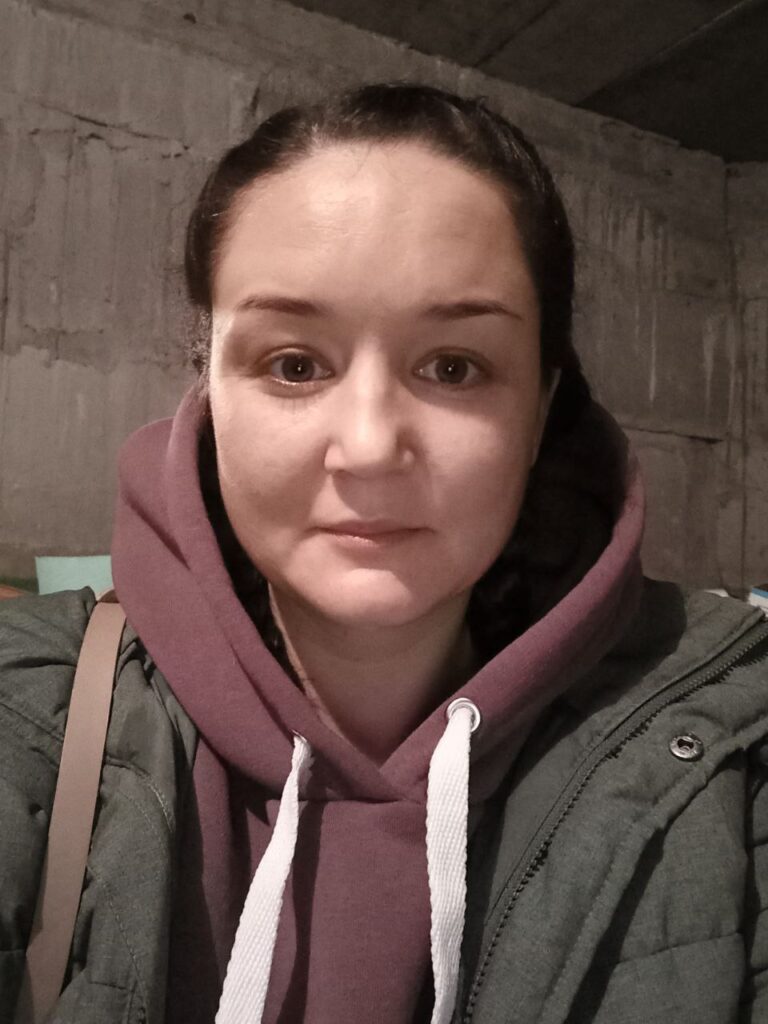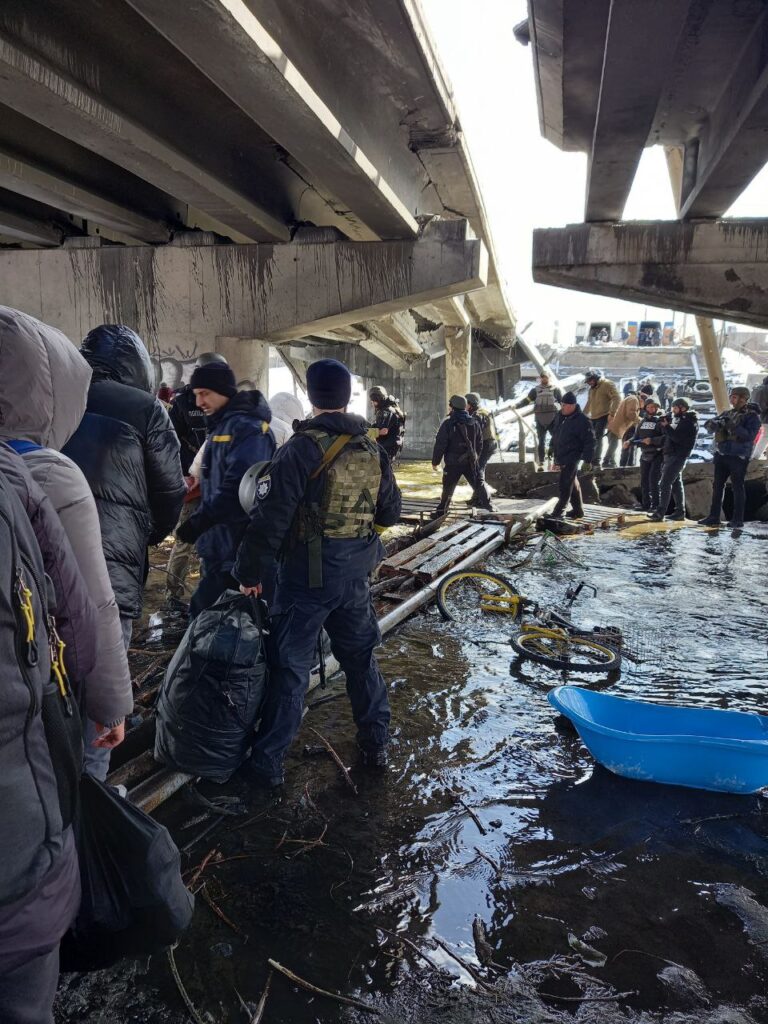Karina left Belarus for Ukraine a few days before the New Year. But the girl had no time to build a new life: the war happened. Karina got out of Bucha under shelling… only to return a month later as a volunteer. About how to survive in hell and rescue her family from the occupation, as well as about life “after”, suicidal thoughts and overcoming post-traumatic stress disorder – in the new material “Not Today, Not Yesterday, Not Tomorrow”.
Karina, 33 years old
“There is constant shooting under the windows, it is simply dangerous to walk anywhere with children…”
During the “protest” years, I openly expressed my position in the column of an independent media outlet (it was later beheaded by the law enforcers). I was not on the staff, so I delayed moving, but a few days before New Year’s Eve, information appeared about a threat to my freedom. The BYSOL Foundation helped me with the evacuation. Having packed literally in 24 hours, on the night of 25-26 December, I drove to Smolensk, from where I hitchhiked to Kyiv.
After the New Year, my friend, also a political emigrant, offered me to move into an apartment he had rented near Kyiv. That’s how I found myself in Bucha together with another family. And two weeks later, a full-scale invasion began – so adaptation in Ukraine didn’t really happen.
We were under the illusion of relative safety: Bucha is close to the capital. No one imagined that Russian troops would approach Kyiv so quickly. And then we were left without communications. Then there was the bombing of the Hostomel airport, which is not far from us. That’s when I realised how serious it was.
We raised our heads and saw fighter planes flying over. Just like in the movies about the Second World War: volleys of fire, the rumble of passing planes. It became clear that this was not a “special military operation”, but a real war.
There were no communications, and we were not local: it was unclear which way was Kyiv and where to go. There was constant shooting under the windows, it was simply dangerous to go out with children. After two days, it became impossible to get out of Bucha on our own. Later it turned out that in the first week of the war the bridges to Kyiv were blown up.

“People who contacted the call centre for help were found dead at intersections…”
Soon there was communication, people were making their way online and creating chat rooms by neighbourhood. In one of them, I learned that I needed help handling incoming calls. That’s how I became a volunteer at the call centre in Bucha.
Meanwhile, the city was in complete chaos – and there were also communication failures. We did what we could. Some people called to tell us about the shooting or dead bodies, some wanted to leave Bucha. There was no evacuation: the authorities could not reach an agreement with the russians.
It became dangerous to get from home to the call-centre: snipers appeared. Once I came across russian soldiers at a railroad crossing. They shouted that you shouldn’t come here, “you’ll explode, everything is booby-trapped,” and swore at me in the back. I had to go back to the apartment.
Then I suggested that the Belarusian neighbours look for ways to retreat on their own. It was clear from the calls to the call-centre: if we stayed in Bucha, we would die. Snipers were shooting civilians, there were dead bodies everywhere. I knew that among the dead there were volunteers who were delivering medicines. People who contacted the call-centre for help were found dead at intersections.
One day we just left the apartment and walked wherever we wanted to go.
My flatmate was with me. It was not easy: the road went through fields, endless shelling… It seemed as if we were crossing an absolutely dead area: during an armed conflict, there is usually no one on the streets. And this emptiness is frightening.
So we reached Irpin. There was an evacuation train from there, and we returned to Bucha so that my neighbour could take his family out by the same route. A day later they received a text message from Kyiv.
On March 8, light and gas disappeared in Bucha. Then I and my Belarusian acquaintance went to Irpin by the way we discovered. The road was blocked by a Russian checkpoint. A soldier with a St George’s ribbon and the letter Z on his helmet told us to wear white ribbons: otherwise we could be shot. I had a white dress in my things: I tore it and made bandages.
At the bus stop in Irpin we met those who had not had time to leave: frightened, crying. There was no more evacuation. But it turned out that Anton, a volunteer, was evacuating people by his own means. He collected a whole bus for evacuation: old people, young people with disabilities. There was no space for us.

But Anton promised to come back for us if he survived.
Two hours later, he took us to a destroyed bridge near Irpin. We passed under it – and on the other side Ukrainian military and many civilians were waiting for us. Some of them, despite the cold – without outerwear. But there were already buses, heating points and volunteers with tea nearby. And it was also possible to talk to the press.
All the way through the checkpoints, I carried a notebook where I wrote about what was happening in Bucha. I told the journalists how it was impossible to bring water to Hostomel, how the call-centre received calls that 14 people were sitting in basements without light, water and food. I told how I managed to get out of Bucha, how I met Russians, how I tied white armbands so that they wouldn’t kill us… Our route was in the lowlands – we were in plain sight, and someone might have thought of organising a human safari.
Later it turned out that people going to their families or looking for food were simply shot in that place. It was a miracle that we were saved and went to Kyiv.
My relatives persuaded me to leave Ukraine, saying that it would all end in death. But I thought: people, even if they were not my compatriots, had faced a catastrophe – how could I leave them in trouble? I had no questions about moving.
I got a volunteer job with a large Ukrainian organisation funded by the President’s office and the Ministry of Sport. We handled calls from all over Ukraine: some needed humanitarian aid, some needed evacuation.
On March 15, it became known that my colleagues from the call-centre in Bucha had been taken prisoner. And two weeks later, photos of the dead appeared online. I was shocked: are these really the same people with whom we were hiding in the basements? I cried over these photos for two days. Later it turned out that the manager of that centre had survived the captivity, and I wrote to him that I wanted to return.
I was ready to do any kind of work: carrying bricks, digging graves.
So, on April 7, I came back and we organised the reception. The first days were hell: not enough people, three laptops for everyone, no internet… Later starlink came, and the red cross arrived, and I became the outreach coordinator. My task is to register as many people as possible for assistance, to record war crimes.
In war, people behave in different ways. The first type is fear, panic. The second is a freezing of feelings. To my surprise, a “blackout” happened to me: I spent the whole day recording crimes, helping to collect data for pathologists, distributing humanitarian aid, and organising funerals. And only after a working day, in a rented apartment, “switched on”, tried to cry my feelings.
Two months passed like that. I think my resource would have lasted longer, if it hadn’t been for legalisation issues. They wanted to deport me, but I managed to get the forced return stamp annulled and continued volunteering, making a residence permit on this basis. However, my nerves were well shaken: it was almost impossible to work legally, everyone was afraid of inspections, and also these questions “why did they hire a Belarusan instead of a Ukrainian? Of course, there were offers to work illegally, but I needed to work either “properly” or not at all. So in the summer of 2023, I left for Poland.

Burnout came later, when it was over – it’s natural for empathic, empathetic people.
My self-defence mechanisms stopped working after six months, and the military PTSD caught up with me. And, according to my psychotherapist, it was strong and chronic (by the way, the events of 2020 in Belarus were not in vain either).
My friends were the first to notice the strangeness: I simply had no strength to live, I had nightmares. After the events in Belarus, there were prisons, law enforcers, and a few months after Bucha I was shot in my dreams.
And then I got really depressed. It was difficult to do things, I lost sleep. I just lay there and did not understand why to live on – such a “survivor’s syndrome”. And it’s not when “I went to the gym and everything went away” – it’s when you have no strength to brush your teeth, when you seriously think about suicide (even though you are brave in front of your friends). Then I found a therapist, with whom we “took out” part of the experience in five months.
I couldn’t decide to go to therapy for a long time. But now I’m glad I got help: I’m much better, everything is behind me.
Now it’s scary to remember that I wanted to kill myself. There are two ways to deal with PTSD: either you make your traumas work for you, or they eat you up for life. I was lucky enough to have a doctor – and I took the first path.
War shatters illusions and removes the unnecessary. You wouldn’t wish that on an enemy, but it’s true. If you know what I mean.
This article was created as part of the Free Belarus Center scholarship program


